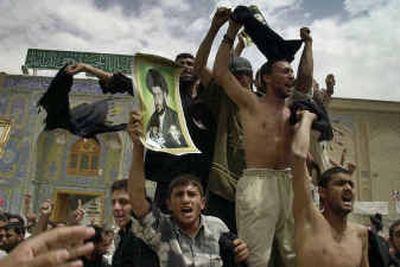Deal fuels hope for peace in Najaf

NAJAF, Iraq – The U.S.-led coalition agreed Thursday to suspend offensive military operations in Najaf after Shiite leaders struck a deal with a radical cleric to end fighting that killed more than 350 Iraqis and 21 coalition troops.
For the first time in weeks, the day passed in this southern Iraqi city without the thud of explosions or the crash of automatic weapons fire. U.S. forces remained in their positions but were not seen in Najaf’s center.
An Associated Press reporter spotted only a few militiamen carrying rifles on the streets. One militia official said fighters were instructed to maintain a low profile.
It was unclear whether any of them who came to Najaf from other Shiite towns and cities had left as called for in the deal. Most of the fighters were believed to be Najaf residents who simply returned to their homes.
The agreement provides the Americans a way out of a standoff that threatened to alienate Iraq’s largest religious community. But U.S. demands for Muqtada al-Sadr’s arrest and disbanding his militia were unmet – and the deal opens the door for a political role for a figure that President Bush had branded a “thug.”
Despite the moves to calm violence in the south, Iraq remains in crisis. Gunmen ambushed a convoy carrying a member of the Iraqi Governing Council, Salama al-Khafaji, as she was returning to Baghdad from Najaf, where she had helping with negotiations.
Al-Khafaji survived but one of her guards was killed and her 18-year-old son was missing, aide Fateh Kashef al-Ghataa said. Al-Khafaji is one of three women on the council and replaced another Shiite woman, Aquila al-Hashimi, who was assassinated in September.
Elsewhere, gunmen attacked a car carrying two Japanese journalists just south of Baghdad, setting the vehicle on fire, Japan’s Foreign Ministry said today. The fate of the two men remained unclear. Also, three mortar shells were fired at coalition headquarters in the Shiite town of Samawah, causing no damage or casualties, Japan’s Kyodo News service reported. Japanese and Dutch troops are stationed in Samawah.
The Najaf agreement was struck early Thursday between al-Sadr and the Shiite political and religious leadership after nearly two months of clashes around this center of Shiite learning and theology.
During fighting this week, Shia Islam’s holiest site, the Imam Ali shrine, was damaged for the second time in a month. The damage was minor, and U.S. officials accused al-Sadr’s followers of causing it.
Al-Sadr’s followers sought to portray the deal as a victory similar to that of Sunni Muslim fighters in Fallujah, who held out against a three-week siege by the Marines until an agreement was forged turning the city over to a new Iraqi force commanded by Saddam Hussein’s former officers.
“The fact that we stood up for a period of about two months against the most powerful force in the world is a victory to us,” Qais al-Khazali, al-Sadr’s spokesman. “We hope that the American initiative to suspend operations is real.”
Coalition spokesman Dan Senor said occupation authorities were not a party to the negotiations with al-Sadr, but he welcomed the deal as a “positive first step” in easing tensions. Violence exploded in April throughout the Shiite heartland south of Baghdad when al-Sadr launched his rebellion in response to a U.S. crackdown.
Senor said U.S. troops would leave most of Najaf once Iraqi security forces return to re-establish law and order.
“Until that time, coalition forces will suspend offensive operations,” Senor said in Baghdad.
“It’s important to recognize that we are not doing this at the behest of Muqtada,” said Brig. Gen. Mark Kimmitt, coalition deputy chief of operations. “The Iraqis are coming to us and saying this would be helpful.”
Since early April, 352 Shiite insurgents and 21 coalition troops have been killed in al-Sadr’s uprising, according to figures compiled by the AP.
Under the deal, fighters from outside Najaf would leave the city and return to the provinces. In exchange, occupation forces would withdraw to their headquarters, the city hall and government buildings, with local police taking over security duties elsewhere, said al-Sadr’s spokesman, al-Khazali.
Al-Sadr’s forces earlier abandoned another Shiite holy city, Karbala, after weeks of intense pounding by U.S. and allied troops. The militiamen remain active in Baghdad’s Sadr City.
The key issues of the future of al-Sadr’s al-Mahdi Army and the criminal charges against al-Sadr will be discussed in a forthcoming “dialogue” between the militia leadership and a committee of Shiite religious and political figures.
Iraq’s national security adviser, Mouwafak al-Rubaie, said he could not say whether the negotiations would lead to the scrapping of the warrant or the disbanding of the al-Mahdi Army.